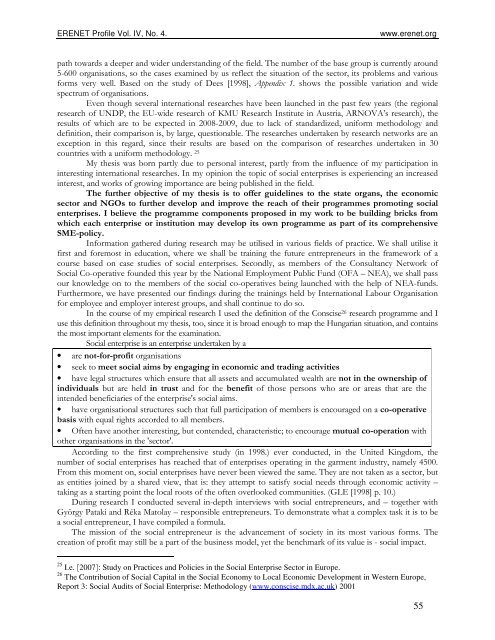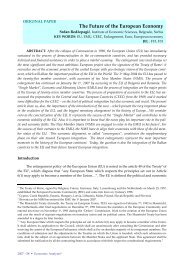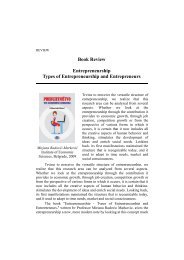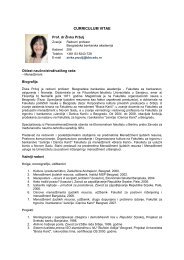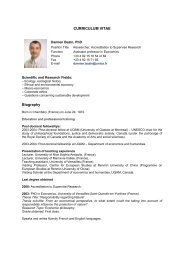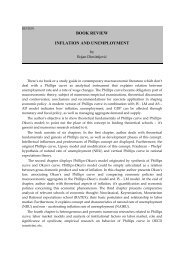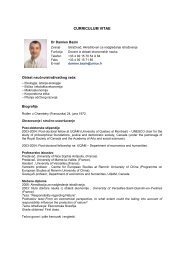Issue 16
Issue 16
Issue 16
You also want an ePaper? Increase the reach of your titles
YUMPU automatically turns print PDFs into web optimized ePapers that Google loves.
ERENET Profile Vol. IV, No. 4.<br />
www.erenet.org<br />
path towards a deeper and wider understanding of the field. The number of the base group is currently around<br />
5-600 organisations, so the cases examined by us reflect the situation of the sector, its problems and various<br />
forms very well. Based on the study of Dees [1998], Appendix 1. shows the possible variation and wide<br />
spectrum of organisations.<br />
Even though several international researches have been launched in the past few years (the regional<br />
research of UNDP, the EU-wide research of KMU Research Institute in Austria, ARNOVA’s research), the<br />
results of which are to be expected in 2008-2009, due to lack of standardized, uniform methodology and<br />
definition, their comparison is, by large, questionable. The researches undertaken by research networks are an<br />
exception in this regard, since their results are based on the comparison of researches undertaken in 30<br />
countries with a uniform methodology. 25<br />
My thesis was born partly due to personal interest, partly from the influence of my participation in<br />
interesting international researches. In my opinion the topic of social enterprises is experiencing an increased<br />
interest, and works of growing importance are being published in the field.<br />
The further objective of my thesis is to offer guidelines to the state organs, the economic<br />
sector and NGOs to further develop and improve the reach of their programmes promoting social<br />
enterprises. I believe the programme components proposed in my work to be building bricks from<br />
which each enterprise or institution may develop its own programme as part of its comprehensive<br />
SME-policy.<br />
Information gathered during research may be utilised in various fields of practice. We shall utilise it<br />
first and foremost in education, where we shall be training the future entrepreneurs in the framework of a<br />
course based on case studies of social enterprises. Secondly, as members of the Consultancy Network of<br />
Social Co-operative founded this year by the National Employment Public Fund (OFA – NEA), we shall pass<br />
our knowledge on to the members of the social co-operatives being launched with the help of NEA-funds.<br />
Furthermore, we have presented our findings during the trainings held by International Labour Organisation<br />
for employee and employer interest groups, and shall continue to do so.<br />
In the course of my empirical research I used the definition of the Conscise 26 research programme and I<br />
use this definition throughout my thesis, too, since it is broad enough to map the Hungarian situation, and contains<br />
the most important elements for the examination.<br />
Social enterprise is an enterprise undertaken by a<br />
• are not-for-profit organisations<br />
• seek to meet social aims by engaging in economic and trading activities<br />
• have legal structures which ensure that all assets and accumulated wealth are not in the ownership of<br />
individuals but are held in trust and for the benefit of those persons who are or areas that are the<br />
intended beneficiaries of the enterprise's social aims.<br />
• have organisational structures such that full participation of members is encouraged on a co-operative<br />
basis with equal rights accorded to all members.<br />
• Often have another interesting, but contended, characteristic; to encourage mutual co-operation with<br />
other organisations in the 'sector'.<br />
According to the first comprehensive study (in 1998.) ever conducted, in the United Kingdom, the<br />
number of social enterprises has reached that of enterprises operating in the garment industry, namely 4500.<br />
From this moment on, social enterprises have never been viewed the same. They are not taken as a sector, but<br />
as entities joined by a shared view, that is: they attempt to satisfy social needs through economic activity –<br />
taking as a starting point the local roots of the often overlooked communities. (GLE [1998] p. 10.)<br />
During research I conducted several in-depth interviews with social entrepreneurs, and – together with<br />
György Pataki and Réka Matolay – responsible entrepreneurs. To demonstrate what a complex task it is to be<br />
a social entrepreneur, I have compiled a formula.<br />
The mission of the social entrepreneur is the advancement of society in its most various forms. The<br />
creation of profit may still be a part of the business model, yet the benchmark of its value is - social impact.<br />
25 I.e. [2007]: Study on Practices and Policies in the Social Enterprise Sector in Europe.<br />
26 The Contribution of Social Capital in the Social Economy to Local Economic Development in Western Europe,<br />
Report 3: Social Audits of Social Enterprise: Methodology (www.conscise.mdx.ac.uk) 2001<br />
55


